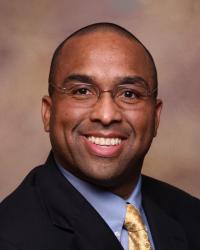Luis Ponjuan: raising a voice against the ‘silent crisis' in education
Education professor Luis Ponjuan, born in Havana, Cuba, was 3 years old in 1970 when he and his family fled their communist homeland, boarding a U.S. government plane on a "freedom flight" to Miami and the United States where they hoped to start a better life.
Ponjuan spoke only Spanish upon entering first grade in the rural town of Franklin, La., where his father worked in a sugarcane mill. Despite hardships, the better life would come.
 Fast-forward to 2010, nearly 40 years after immigrating to the U.S. Earlier this year, Ponjuan was addressing a national briefing at the U.S. Capitol to raise awareness of the overwhelming barriers that minority male students—particularly Latino boys—face in America's educational system. He could have spoken from personal experience, but he's also a fast-rising scholar on diversity issues of gender and ethnicity in higher education.
Fast-forward to 2010, nearly 40 years after immigrating to the U.S. Earlier this year, Ponjuan was addressing a national briefing at the U.S. Capitol to raise awareness of the overwhelming barriers that minority male students—particularly Latino boys—face in America's educational system. He could have spoken from personal experience, but he's also a fast-rising scholar on diversity issues of gender and ethnicity in higher education.
"An emerging trend shows that young men of color—particularly Latino Americans—are far less likely to attend or stay in college than other young men and women," said Ponjuan, assistant professor of educational administration and policy at UF's College of Education. "Considerable attention has been given to the plight of African-American males, but declining enrollment among young Latino men is even more pronounced. It's a silent educational crisis because young Latino males are vanishing in higher education and no one is noticing."
Latinos are now 15 percent of the U.S. population. Yet Latinos, or Hispanics, earn only 6 percent of all bachelor's degrees, according to the American Council on Education. This is significantly less than whites, blacks and Asians.
The Capitol Hill briefing highlighted some of the daunting challenges young Latino men face, including poverty, language barriers, lack of role models, loss of cultural memory, and peer and family pressure.
"My parents insisted that my brother, sister and I keep up with our studies, but it wasn't easy," Ponjuan said. Still, he flourished in his academic efforts while balancing several jobs and family responsibilities, and went on to earn degrees from the University of New Orleans and Florida State before receiving a doctorate in higher education from the University of Michigan.
His early professional career included a five-year stint as an academic adviser at UF, before joining UF's education faculty in 2005 upon completing his doctoral studies.
Ponjuan now is collaborating with researchers in several UF colleges and at the University of Texas-Austin on plans to create an interdisciplinary center aimed at better understanding the challenges that America's increasingly diverse student population faces in their educational experiences.
"Our country's future economic prosperity requires expanding a workforce that includes a diverse and educated pool of well-trained workers," Ponjuan said. "We must erase disparities in educational attainment and train young men of color to become vital contributors to our national economy."
# # #




